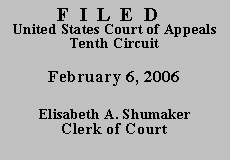

| HELEN W. COLEMAN, also known
as Helen Snell,
Plaintiff-Appellant, v. DAN G. BLAIR, Acting Director, Office of Personnel Management; RANDALL W. RICHARDS; OSCAR HOWARD COLEMAN, Defendants-Appellees. |
|
Plaintiff-appellant Helen W. Coleman appeals the district court's dismissal without prejudice of her action for lack of subject matter jurisdiction. See Fed. R. Civ. P. 12(b)(1). We have jurisdiction to consider this appeal under 28 U.S.C. § 1291. We affirm.
Ms. Coleman alleged in her complaint that defendants-appellees Oscar Howard Coleman, her former husband, and his divorce attorney, Randall W. Richards, fraudulently caused a divorce decree to grant her only forty and not fifty percent of Mr. Coleman's federal civil service retirement annuity, in spite of the terms of a decree of separate maintenance providing that she would receive fifty percent. She also alleged that defendant-appellee Dan G. Blair, acting director of the United States Office of Personnel Management (OPM), acted as an accomplice to the fraud and embezzlement perpetrated by Mr. Coleman and Mr. Richards by improperly relying on the fraudulent divorce decree and denying her the additional ten percent of the annuity.
Defendants, relying on separate grounds, moved to dismiss for lack of subject matter jurisdiction. The district court granted Mr. Blair's motion deciding that there was no subject matter jurisdiction because (1) Ms. Coleman failed to identify a waiver of sovereign immunity; (2) she failed to exhaust federal administrative remedies with the OPM and Merit Systems Protection Board and then failed to file a lawsuit in the proper federal court, the Federal Circuit; (3) she had no private right of action to bring claims under Title 18 of the United States Code; (4) her claims under Title 28 did not waive sovereign immunity; and (5) she failed to exhaust administrative remedies for a tort claim under the Federal Tort Claims Act. Also, the district court granted Mr. Coleman's and Mr. Richards' motion to dismiss for lack of subject matter jurisdiction, deciding that Ms. Coleman's claims against them did not raise a federal question and there was no diversity of citizenship.
On appeal, Ms. Coleman continues to argue that she is entitled to half of the annuity. In addition, she argues that the district court improperly dismissed this action for lack of subject matter jurisdiction instead of addressing the merits of her arguments.
We review the district court's dismissal for lack of subject matter jurisdiction de novo. U.S. West, Inc. v. Tristani, 182 F.3d 1202, 1206 (10th Cir. 1999). Also, we liberally construe Ms. Coleman's pro se filings. See Haines v. Kerner, 404 U.S. 519, 520 (1972).
Applying these standards, we conclude the district court correctly dismissed this action for lack of subject matter jurisdiction. We affirm for substantially the same reasons stated by the district court in its order granting defendants' motions to dismiss dated June 8, 2005. R., Doc. 42.
Ms. Coleman also argues on appeal that the district court erred in refusing to allow her to subpoena OPM records. We conclude the district court did not abuse its discretion. See EEOC v. Dillon Cos., 310 F.3d 1271, 1274 (10th Cir. 2002) (recognizing this court reviews district court ruling on subpoenas for abuse of discretion).
The judgment of the district court is AFFIRMED.
Entered for the Court
Circuit Judge
*. This order and judgment is not binding precedent, except under the doctrines of law of the case, res judicata, and collateral estoppel. The court generally disfavors the citation of orders and judgments; nevertheless, an order and judgment may be cited under the terms and conditions of 10th Cir. R. 36.3.